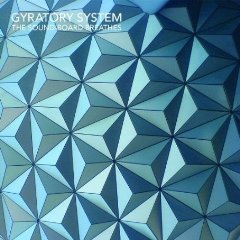At last: a home-grown release that can hold its own alongside the boundary-pushing, post-rock and techno-informed heavy groove records that have come out of America, Canada and Japan over the last couple of years. The Sound Board Breathes is as challenging and danceable as anything from the likes of Holy Fuck, Nisennenmondai or Battles, yet possesses a distinctly British sensibility all its own: quirky, eccentric and drawing on a heritage that runs from post-war experimental jazz to early 80s post-punk, from formal avant-garde composition to high church UK rave.
Gyratory System are the project of Andrew Blick and his septuagenarian father, Robin; both distinguished trumpet players, with Robin a hip fixture on the trad and bebop scenes of early 60s London, while Andrew worked as an in-demand session player with the better class of nineties indie bands, his CV including Cinerama, Broken Dog, Moose, Moonshake, Miranda Sex Garden and Medieval Baebes- the latter two both fronted by Andrew’s sister, Katherine. Andrew was most recently a member of the excellent but under-appreciated One More Grain, and for the past decade he and his father have played together in the organic/electronic progressive jazz-funk outfit Blowpipe, from whose sound Gyratory System seem a natural development: shrugging off any lingering associations with Acid Jazz, and hurling themselves fully into the bracing, often atonal maelstrom of post-kraut freak beat and gnarly sonic manipulation.
Apparently inspired, in part, by the Brentford Musical Museum of automatic instruments, one could almost imagine that Gyratory System recorded this album using some kind of fiendishly tangled Scalectrix set-up, re-wired as a sound generator, the noises triggered by the miniature cars whizzing around the track, lights flashing and horns blaring as they speed past. By extension, one could also imagine it as a kind of terrifying sonic car chase around London’s streets, in perpetual motion not just geographically but temporally too, flashing stroboscopically backwards and forwards in time but always somehow claustrophobically confined by the city limits, like the character of Norton in Iain Sinclair and Dave McKean’s graphic novel Slow Chocolate Autopsy.
Indeed, the song titles are often pleasingly London-centric, such as ‘Barons Court Turret,’ which sounds like some ketamine-konked kazoo orchestra hooking up with a sozzled ska band to stagger from one shabby West London boozer to the next, trading licks with increasing abandon, and led by two raffish-looking coves who look a lot like the chaps from Yello. ‘Sea Containers House’ has a queasy, Brit-noir movie score lurch, a possible soundtrack to a film of Alexander Baron’s cult 1963 London novel The Lowlife. The post-war ambience is fractured as oscillating techno spills out of an illegal drinking club: Barry Adamson meets Orbital, with a Pigbag chaser. Indeed, tracks like the off-kilter dancefloor anthem-in-waiting, ‘Yowser, Yowser, Yowser’ are very much rooted in the dark punk-funk-electro-jazz of the early 80s- Pigbag, ACR, even Clock DVA.
Elsewhere, the disorienting abstraction of the music drives your reviewer to even more fevered comparisons, as ‘And Princess Margaret’ conjures up an aural traffic jam in Trafalgar Square, gridlocked with horns jammed, conducted from atop Anthony Gormley’s open plinth by a deranged Cornelius Cardew. On ‘Party Unlimited,’ those car horns blare out an angry football-chant rhythm, ramping up the irritation factor at the same time as the track lodges itself immovably in your cerebral cortex. And if the influence of Miles Davis circa On the Corner is most readily apparent on ‘Tinseltown,’ then the title track is the sound of a 1920s Salvation Army marching band, accidentally stepping through a portal into another dimension where God is a painted circus clown, driven insane by the sound of his own endless laughter.
The journey ends with the nine-minute finale of ‘Holloway Road’: tense, rhythmic clicks are gradually overcome by acid squelches, moving, as it were, from the jazzy beat of an early 60s kitchen sink drama to the locked-down pulse of an end-of-century rave. Then churning bass and erupting brass fill in the picture like a fleet of delivery vans, goods lorries and London buses rumbling into view, belching smoke, brakes squealing, engines groaning and horns barking. By this time, it’s apparent that Gyratory System inhabit their own universe, drawing on disparate musical references but aping no-one. This initially forbidding album is a gruelling but enervating trip, packed with slowly revealed delights, much like London itself. At its conclusion, you may find you’ve come full circle with a bump; but soon, you’ll want nothing else but to begin all over again.


